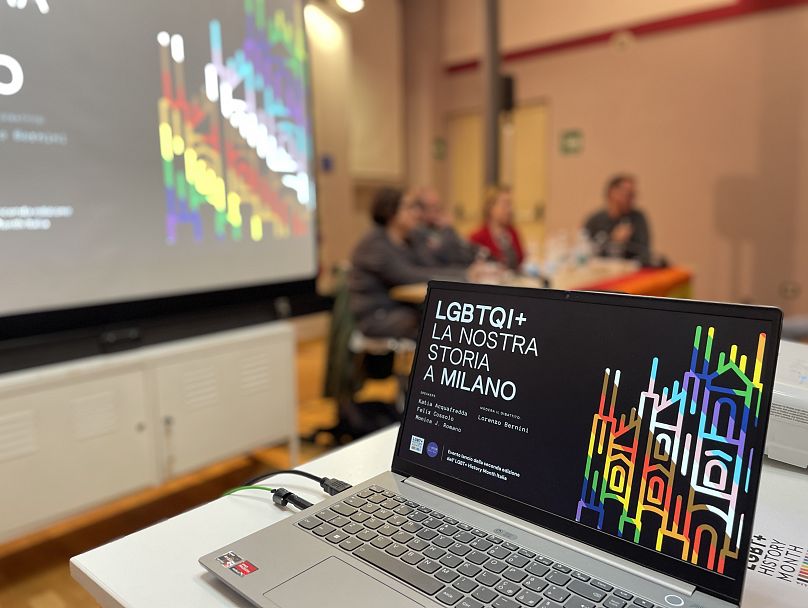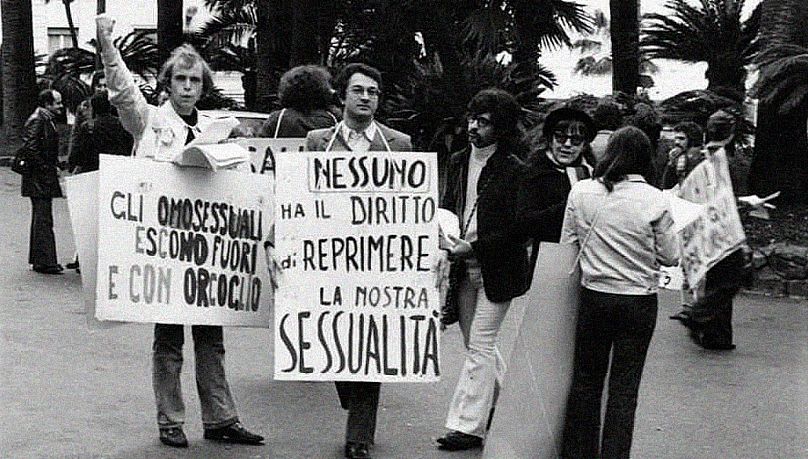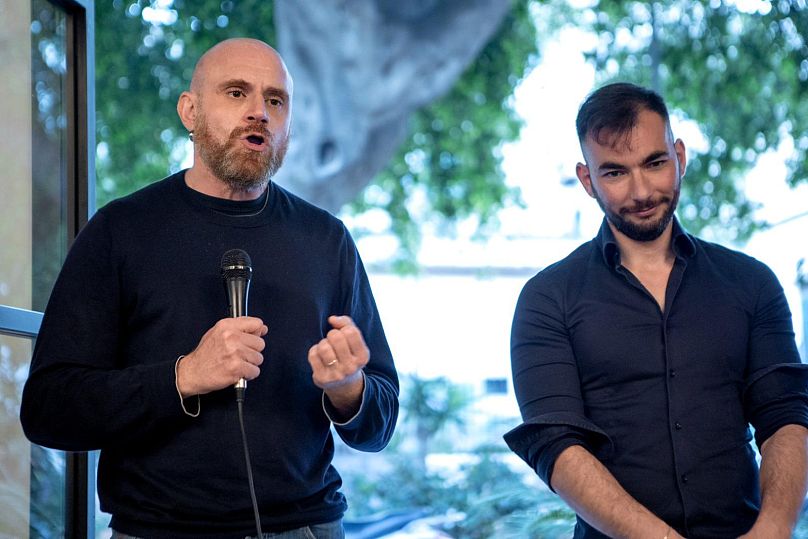From the outside, following its change of government and move to the far-right, Italy appears dramatically different to a year ago, putting extra emphasis on its second ever LGBT History Month, as Andrea Carlo reports.
This month, Italy celebrates its second LGBT History Month, with a variety of events and seminars being held in its honour throughout the coming weeks.
In a country where queer people have often struggled to find acceptance, activists are hailing this initiative as a crucial opportunity to shed further light on the community’s past and present.
But could the country’s new far-right government threaten its future?
From rural Missouri to Milan’s city hall: LGBT History month's origins
Back in 2021 – as Italy emerged from the depths of the Covid-19 pandemic – a group of Italian academics, working from across Europe and both sides of the pond, decided it was time to pool their resources and start a new LGBT History month, following the lead of other European countries.
Launching the project in April of the subsequent year, the organisers published a call for event proposals. Nothing could have prepared them for the avalanche of requests they received.
“We wanted to bring this cultural initiative to Italy,” said Chiara Beccalossi, co-founder of Italian LGBT History Month. “At the start, we thought we would get 20 or so events, but we ended up with 150. We couldn’t keep up – we were overwhelmed.”
While Italy may have just started celebrating its own LGBT History month, the initiative has been around for many years, and traces its roots to the deep US Midwest.
It all started in 1994, when Rodney Wilson – then a high school teacher in suburban St. Louis, Missouri – noted the glaring lack of queer references in his history textbook. This prompted him to reach out to various organisations, eventually leading to the creation of LGBT History Month, which the US celebrates in October.
In the almost three decades following Wilson’s pioneering effort, the initiative has snowballed into a global movement with its very own international committee.
Wilson, now 58, remains – in the words of one of his colleagues – the “heart and engine” of LGBT History Month, and closely follows developments in Italy.
“A history month is an opportunity to say, ‘let’s shine a light on these formerly neglected stories’– stories that have sometimes been intentionally erased,” Wilson told Euronews Culture. “In Italy’s case, this is a chance to highlight stories that are unique to the country. And what the [Italian team] is doing is amazing.”
Why April? The history of Italy’s LGBT movement
The genesis story of LGBT rights movement is often told from an American lens, with particular attention granted to the 1969 Stonewall riots.
But Italy boasts its own LGBT movement, with a proud and distinctive history.
While one could make the case that the earliest example of queer resistance dates back to 15th-century Florence - when a group of young men decried Savonarola’s anti-sodomy persecutions - the timeline of LGBT activism in Italy has a clearer starting point in the 1970s.
On 5 April 1972, around forty demonstrators from various Marxist gay liberation movements stood outside a medical conference in Sanremo, protesting against homosexuality’s classification as an illness. A landmark event, it led to campaigners picking April as the month in which to honour Italian LGBT history.
Indeed, despite Italy’s deep-seated parochialism and with the looming aegis of the Vatican, the country has seen certain glimmers of progress.
Italy, for instance, elected Europe’s first openly transgender member of parliament, Vladimir Luxuria, in 2006, and its 1982 law on sex change recognition was deemed particularly progressive for the time.
Moreover, queer communities are embedded within certain parts of the country’s complex social fabric. In the Campania region, the so-called femminielli (‘effeminate men’) – described by sociologists as a gender non-conforming category – are deemed harbingers of good luck, and have their own religious celebration every February.
A decades-old homophobic murder reignites a public debate
Kickstarting the season last week with a panel discussion in Milan, this year’s LGBT History Month packs an impressive total of over 60 events.
“There’s everything,” noted Beccalossi. “From poetry readings, events on the history of kink to meetings organised by Christian associations.”
But out of all the topics being covered, there’s one that’s on everyone’s lips – namely, a resurfaced decades-old homophobic crime.
Last month, a new film titled Stranizza d’amuri hit Italy’s silver screens, loosely based on an unsolved double homicide case known as the delitto di Giarre, or ‘Giarre murder’.
Back in 1980, two Sicilian youngsters were found dead under a pine tree. The bodies belonged to two zitti (local dialect for lovers), Giorgio and Toni, who had gunshot wounds to their heads.
While the cause of their death was never officially established, the ensuing furore shed a harsh light on the country’s deep-seated homophobia and proved a pivotal moment in Italian history, spurring the creation of the country’s leading LGBT organisation, Arcigay.
Francesco Lepore, a former Catholic priest-turned-LGBT activist, has looked at the case more closely, writing a book where he claims the star-crossed couple’s death was a family honour killing. Speaking to Euronews Culture, he re-emphasised its historic importance.
“The Giarre murder was a real catalyst for the foundation of Arcigay,” he stated. “It was an important moment for Italy’s LGBT movement, and shocked the public.”
The recent film was directed by renowned Sicilian actor Beppe Fiorello, who seeks to ‘atone’ for the bloodshed committed on his native island, and has sparked nationwide interest.
“Inevitably, a lot of [LGBT History Month’s] events this year are debates about the Giarre murder,” Beccalossi remarked. “The film generated a lot of interest in the topic.”
‘Why LGBT History Month matters’: Could Italy’s new government endanger its future?
Italy remains western Europe’s weakest link on LGBT issues – lacking same-sex marriage, for instance. Nevertheless, broader acceptance of the community has grown by leaps and bounds over the past decade.
Such progress, however, could be hampered by the recent election of Giorgia Meloni and her right-wing government last year – which campaigners argue makes initiatives such as LGBT History Month even more vital.
The new PM and her cabinet have not hesitated to begin implementing their conservative agenda, telling Milan’s city council to stop registering the children of same-sex couples – a move met with public dissent.
“It’s worrying,” stated Monica Romano, Milan’s first transgender city councillor. “They’re trying to drag LGBT [people’s rights] back into the sphere of public order.”
“In light of this, we must find more public money to sponsor events on Italy’s LGBT history and culture,” Romano added. “Not enough has been done on this.”
And LGBT History Month’s organisers themselves are beginning to feel the tides turning.
“We’ve seen a slight reduction of events in schools,” noted Oscar Bertolissi, one of the movement’s co-founders. “I think this has been a reflection of the change of government. We’re on the level of Poland and Hungary now.”
But when asked whether LGBT History Month – and the broader LGBT movement – could be threatened by recent developments, the movement’s organisers retain a few crumbs of comfort, optimistically pointing to how the Italian public has often proven to be more socially progressive than its politicians.
“People are going to the squares to protest, mobilising like never before,” Beccalossi stated. “You can really feel the anger.”
“Our government doesn’t value diversity,” she concluded. “But Italian society is so much more forward-thinking than what our government thinks.”















